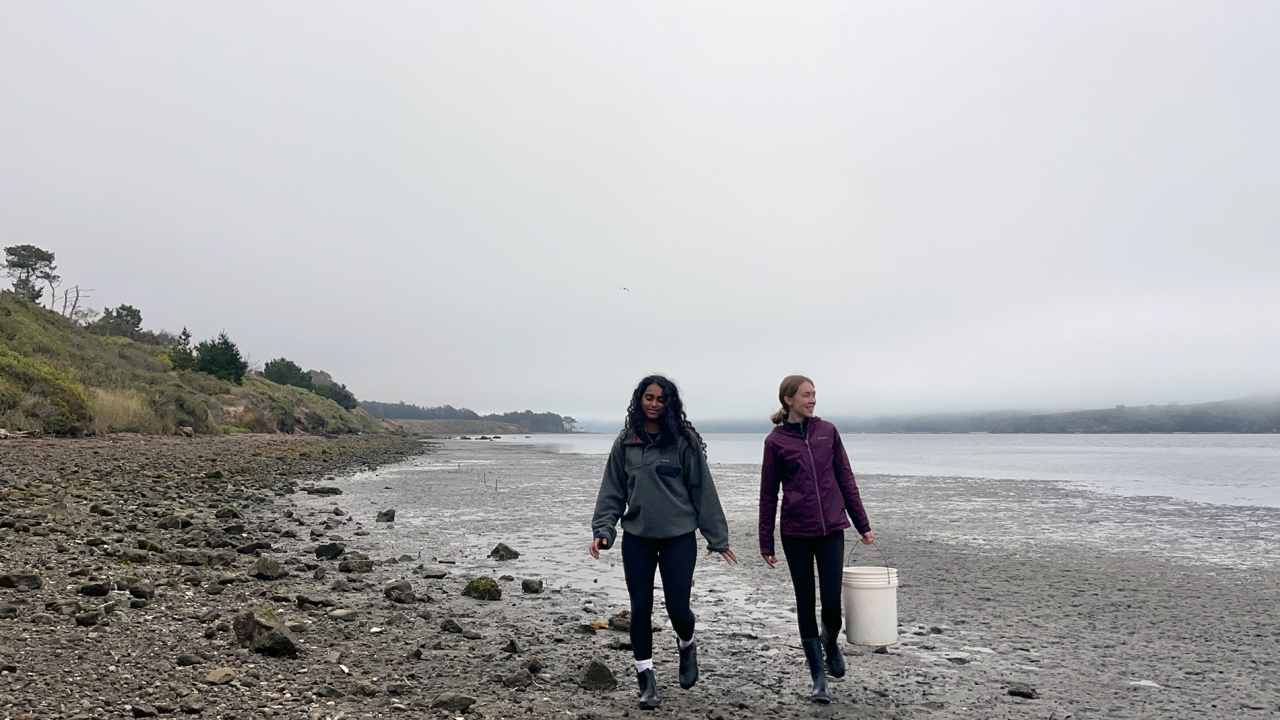
EVE Scholars Explore New Depths at the Bodega Marine Lab
At UC Davis, undergraduates have opportunities to dive into independent research at the Bodega Marine Laboratory (BML) through the EVE Scholars Program. Students like Aishu Santosh and Caroline Donohew are pushing the frontiers of marine science while discovering a lot about themselves in the process.
Aishu Santosh: Tackling Invasive Anemones

Aishu Santosh, a fourth-year student majoring in Marine and Coastal Science, was awarded a Kendra M. Chan Award through the EVE Scholars Program and is working in Anya Brown’s lab. Her research is focused on a species of nonnative anemones and what makes them successful invaders in a new territory. She’s looking at factors like sediment types and their photosynthetic capabilities with symbiotic algae.
Although she is completing an independent research project, she’s found tremendous value in being part of a lab group.
“In the Brown lab, there’s always something exciting happening with our eelgrass projects and fieldwork. It means early starts—like 3 am wake-ups for surveys—but being part of the lab, you have a responsibility to be part of what everyone is working on and you learn so much by doing that. It’s one thing to learn about the scientific method in class, but applying it in real-world research is a whole new level.”
Caroline Donohew: Studying Invasion Impacts on the Community

Caroline Donohew, a fourth-year student majoring in Environmental Science and Management, is conducting her research in Eric Sanford’s lab with the help of a Robert and Rosabel Osborne Undergraduate Research Award. Caroline is studying the same species of nonnative anemone in Tomales Bay, but is focused on their impacts on the surrounding invertebrate community.
“I remember filling out worksheets on the scientific method, and now I’m actually doing it! It feels natural now because we’re surrounded by it. Working with Keira (Monuki) in Eric’s lab has been a great opportunity to ask questions about grad school and see how the BML community operates. The labs here aren’t separate or competitive—they have different strengths and focuses, but everyone collaborates and supports each other.”
Life at BML vs. Davis
Both Aishu and Caroline have found BML to be a whole different world compared to the main campus in Davis. Aishu explains that she feels more like a grad student at BML.
“This summer was eye-opening. It’s like getting a sneak peek at what pursuing a PhD or long-term research might be like. This experience has really shaped my career goals.”
Caroline agrees, pointing to the value of informal conversations and the constant learning they enable. “Whether it’s during coffee hour, lunch, or just hanging out in housing, I’m always picking up new insights. It’s helped me figure out what I want—and don’t want—in my future career.”
The Ups and Downs of Fieldwork

Fieldwork at BML comes with its own set of challenges and rewards. Aishu notes a big shift from regular undergraduate coursework to managing every aspect of her own research project. Working with live animals and coordinating fieldwork that relies on the tides and weather adds additional layers of complexity.
Caroline highlights the importance of time management and flexibility. “Fieldwork depends a lot on tide cycles, so prepping for those intensive weeks is essential. Being sick recently during a good tide week was tough, but having a 10-week project means there’s time to recover. Flexibility is just as important as having a solid plan.”
Building Confidence and Skills
Both Aishu and Caroline stress the value of opportunities like the EVE Scholars Program. Aishu points out that there are only a handful of scholarships like this that international students like her can apply for. Although at first Aishu was hesitant to apply, thinking that it was a long shot, she’s glad she worked up the courage to try and even more grateful to have gotten it.

Ultimately, the experience is focused on the student’s growth. As Jay Stachowicz, Interim Director of the Coastal and Marine Sciences Institute and a Professor of Evolution and Ecology at UC Davis, explains, “This program is about allowing students to step out of their comfort zone and confront the challenges of pushing the frontiers of our understanding.”
Now in its second year, the EVE Scholars program is hosted by the UC Davis Department of Evolution and Ecology, supported by the Kendra M. Chan Fellowship, the Nieland Family Fund, the Osborne Chair Fund, the Coastal and Marine Sciences Institute and other donors. This support has allowed the program to grow significantly in just a few years. In 2024, they were able to offer 13 fellowships, with 5 of the students working at BML and 8 in labs on the Davis campus. Scholars are awarded a stipend for a 10 week full-time internship under the direction of a faculty member at the Bodega Marine Laboratory or on the Davis campus.
Caroline is already feeling the impacts of the experience.
“I’m becoming comfortable with not knowing everything, and being treated as an equal to grad students has been empowering. I’ve built so many connections and added so many life skills to the base of hard science I came in with.”
In short, EVE Scholars at the Bodega Marine Lab are getting an incredible blend of hands-on scientific research, community collaboration, and personal growth. It’s an experience that’s setting them up for exciting futures in marine science.
Media Resources
- This story was originally published by the Coastal and Marine Science Institute.
- Learn more about the EVE Scholars Program.
